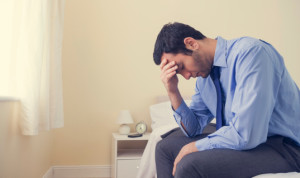Common Signs of Depression in Men
 In a previous blog, the link between adult male depression and sexual addiction was discussed. (Essentially, hypersexual behavior is used compulsively as a way to escape the emotional pain of depression, over time becoming an addictive pattern.) That blog noted that the current diagnostic criteria for depression are skewed toward women, not taking into account the ways in which depression typically manifests in men. As a result, depression tends to be viewed by both the general public and the therapeutic community as a “women’s problem.” However, recent research indicates that just as many men as women suffer from this debilitating psychological condition.
In a previous blog, the link between adult male depression and sexual addiction was discussed. (Essentially, hypersexual behavior is used compulsively as a way to escape the emotional pain of depression, over time becoming an addictive pattern.) That blog noted that the current diagnostic criteria for depression are skewed toward women, not taking into account the ways in which depression typically manifests in men. As a result, depression tends to be viewed by both the general public and the therapeutic community as a “women’s problem.” However, recent research indicates that just as many men as women suffer from this debilitating psychological condition.
Depression itself is relatively similar in both men and women. The underlying feelings of sadness, hopelessness, and disinterest are the same. Yet men are much less likely to talk about these feelings. As such, male depression can be difficult to identify and diagnose. That said, there are definite indicators (manifestations) of male depression, the most common of which are:
- Substance Abuse: At least 30 percent of active alcoholics (both genders) suffer from major depression. Typically, substance abuse and depression feed one another, especially when the drug of choice is a depressant such as alcohol.
- Compulsive Sex, Spending, Gambling, Video Gaming, Etc.: Much as they do with substances of abuse, depressed men may compulsively utilize emotionally intense behaviors (sex, for instance) as a way to ward off or escape sadness.
- Sexual Dysfunction: Depression and erectile dysfunction often manifest simultaneously. Interestingly, each issue can lead to the other. Complicating matters is the fact that sexual dysfunction is a potential side effect of many antidepressant medications. (FYI: sexual dysfunction does not preclude sexual addiction.)
- Chronic Headaches, Stomachaches, Backaches, Etc.: Depression often manifests as physical pain, more so in men than women because men tend to internalize their problems and suffer in silence.
- Irritability, Anger, Hostility: Anger is a coping mechanism for many men (depressed or otherwise). It is a way to act as if they are in control even though they feel out of control. Depressed men may also become irritable or hostile when their depression has caused them to withdraw and isolate and they feel pressured by friends or family to rejoin the living.
- Issues with Sleep: Depressed men often can’t get to sleep, or they can’t stay asleep, or they can’t wake up.
- Fatigue: Constantly feeling tired, regardless of how much sleep a person is or is not getting, may be indicative of a deeper physical problem. More often, however, it is a symptom of depression.
- Isolation, Withdrawal, and Loss of Interest: Depressed people tend to pull away from friends and loved ones. They also lose interest in previously enjoyable activities such as exercise, hobbies, and creative endeavors.
- Indecision and Difficulty Concentrating: Depression fills the mind with negative thoughts, and these thoughts can make it difficult to focus. Sometimes very simple tasks such as paying bills can become incredibly difficult, even if there’s plenty of money in the bank.
- Stress and Anxiety: Feeling stressed out and anxious can both cause and result from depression.
- Suicidal Ideation: Women are more likely than men to attempt suicide, but men are much more likely to complete the act. Older men are the highest risk group. It should be noted here that depression is NOT a normal part of aging, nor should it ever be treated as such.
No matter the outward symptoms of depression, men will likely downplay and minimize them. Simply put, men are much less likely than women to openly discuss difficult feelings, especially sadness, because expressing or admitting to emotions other than anger and passion can be thought of as unmanly. Even men who may suspect or know that they are suffering from depression will sometimes avoid diagnosis and treatment, worried that the stigma of depression might label them as weak and potentially damage their relationships and career. However, ignoring, suppressing, and covering up depression will not make it go away. In fact, it generally exacerbates the situation, often resulting in addiction or some other compulsively utilized “numbing” mechanism.
Happily, when depression and addiction are intertwined, there are clinicians and treatment centers that can help men to unravel the issues. These clinicians and rehab centers understand that 80 percent or more of people with depression, regardless of gender, can be treated successfully with psychotherapy, pharmaceuticals, or a combination thereof—but only if they are willing to seek professional assistance, which depressed men are often reluctant to do.